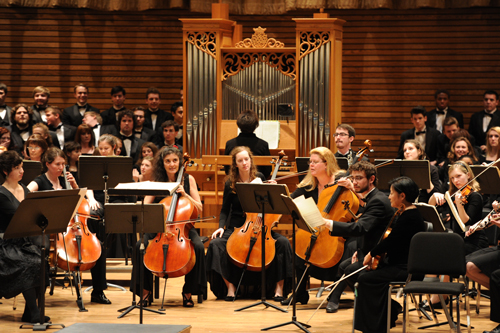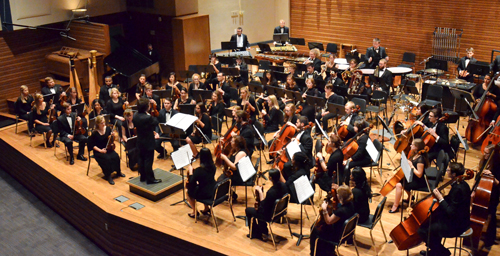by Daniel Hathaway
“Tradition and innovation in the same moment: it’s like Bach.” That’s just one line from an ode to Johann Sebastian Bach that introduces the 83rd Baldwin Wallace Bach Festival to visitors on its website, but it sums up the character of this weekend’s Festival under its new management.
“We’re moving on,” Dirk Garner said in a phone conversation from his studio in Berea, where he serves as Gigax Chair for Choral Studies at the Baldwin Wallace University Conservatory of Music, and now as artistic director of the BW Bach Festival, the oldest collegiate Bach festival in the country. “The fun part — and the hard part — of this position is maintaining the tradition of the beloved Bach Festival, and at the same time trying to do new things.”
For years, the Festival has centered itself around a performance of one of Bach’s major choral works. The St. John and St. Matthew Passions, the Christmas Oratorio and the Mass in b minor rotate on a four-year cycle, guaranteeing that every BW singer has the opportunity to participate in one of those landmark works during a college career. In keeping with that tradition, Dirk Garner will lead his University and Motet Choirs and the Bach Festival Orchestra in the B-minor Mass on Saturday evening, April 18 at 7:00 pm in Gamble Auditorium.
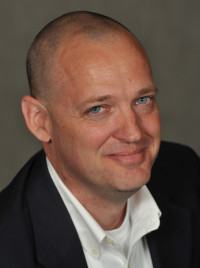
Dirk Garner
Otherwise, new winds are blowing in Berea. One of Garner’s innovations is Bach Haus, which operates outside the Festival schedule in an attempt to involve more people in Bach’s music in new ways. The first edition, held last October in Fynette Kulas Music Hall — the Conservatory’s recently repurposed church sanctuary — brought the BW Beatles, BW Music Theatre and the Front Porch Bluegrass Band together for a fusion event in a coffeehouse setting. “It sold out immediately, weeks ahead of time. My wife played Bach on the piano and we served coffee and vegan pastries provided by a BW alum. The event was so exciting,” Garner said. “We held another one in February and had the same experience. This is part of our plan to expand our programming — to do more than just Bach’s music and to do it in a variety of ways, not simply as concerts. Next year, we’ll move Bach Haus off campus into other non-traditional venues.”
Bach Festival has always included lectures, but one of this year’s talks will head off in a new direction. “We’re going to have Ian Woods, a neuroscientist from Ithaca College, talk about ‘Bach and the Brain’ on Friday, April 17 at 3:30 pm, the first in a regular series of lectures about topics relating to Bach or history. The possibilities are truly limitless. You can really talk about anything and connect it with Bach Festival. This is emblematic of the types of changes people will see in the future.”
A more traditional lecture by Stephen Crist of Emory University will be given on Saturday, April 18 at 1:00 pm. “Mass Pandemonium: Why Bach’s Greatest Composition is a Magnet for Controversy” will focus on the Mass in b-minor. “He’ll talk about all the mystery that surrounds the Mass,” Garner said, “which involves layer after layer of complexities. Crist’s other major area is jazz — he’s actually a jazz pianist as well as a classical music scholar. I hope he gets into jazz a little while he’s here. He’d be perfect for Bach Haus.”
The traditional solo recital will be an organ concert on Saturday, April 18 at 3:00 pm in Berea Methodist Church, when Eastman School of Music professor Edoardo Maria Bellotti will play Bach, Vivaldi and Pasquini on the 1974 Rudolph Janke organ — as well as improvising on submitted themes.
Another innovation that Festival regulars will experience this year is the redesign of the opening concert, which will take place on Friday, April 17 at 7:00 pm. “The singers have always been deeply involved in the Festival, but we’re trying to pull BW instrumentalists into fuller participation,” Garner said. Thus he invited BW’s new orchestral director, Octavio Más-Arocas to develop a program using the whole BW Symphony Orchestra. “He asked me what I wanted,” Garner said. “I told him it needs to be related to Bach, but he could be creative.”
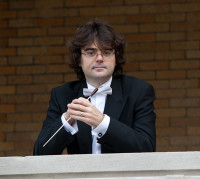
Octavio Más-Arocas
“When I looked at the previous Bach Festivals, I thought what was missing was the effect Bach had on other composers,” Más-Arocas said in a telephone conversation. He spent a great deal of time coming up with a program that explores that topic through music by Steven Stucky, Ottorino Respighi, Luciano Berio, Arvo Pärt and Tom Trapp. And by J.S. Bach himself — with a twist.
“Stucky is one of my favorite composers,” Más-Arocas said. “His Funeral Music for Queen Mary (after Purcell) is almost a literal quotation of Purcell’s music at first, but it shows how earlier music affected the work of later composers.”
The Bach work is a solo cantata for countertenor, Vergenügte Ruh, beliebte Seelenlust, to be sung by Eric Jurenas and choreographed for LoftDance by Jennifer McQuiston. “It’s the later version of cantata 170 with organ rather than flute obbligato. The dancers are outstanding,” Más-Arocas said. “I wanted to provide a visual dimension to the piece, something rooted in Bach, but with a bit extra.”
The conductor noted that Respighi’s orchestration of Bach’s organ Prelude and Fugue in D, like the Stucky, is almost a literal version of the original. “His instrumentation is usually very bright — like the Pines of Rome, Church Windows or Roman Festival — but here it’s much darker. It’s still upbeat but without the usual celesta, glockenspiel and piccolo. Even if the audience doesn’t know the original Bach, they’ll get a powerful impression.”
Más-Arocas called Luciano Berio’s Contrapunctus XIX “a complicated, intricate but intimate” reworking of a movement from Bach’s Art of Fugue. “It sounds very contemporary, a more cerebral side of Bach where everything is contained and structured and makes a lot of sense. In Arvo Pärt’s Collage on B-A-C-H, you’ll hear Bach but in Pärt’s own way — like a classic painting with modern colors.”
The most intriguing title on the Friday evening program is Tom Trapp’s Headless Snowman. “There’s no good reason for the title, it’s just random,” Más-Arocas said. “The piece was commissioned for Kristjan Järvi’s Absolute Ensemble as part of a set of pieces based on Bach. I would call it ‘Baroque Modern.’ It uses electric guitar, jazz clarinet and saxophone soloists — music you might expect to hear in a bar, but you’ll recognize Bach and his counterpoint for sure!”
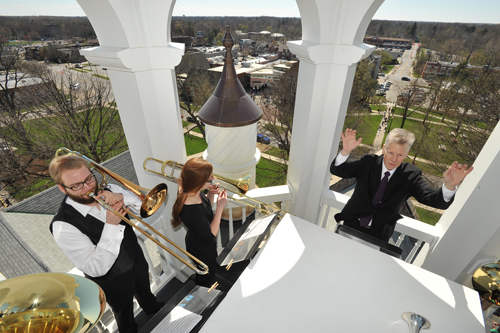
John Brndiar and the Festival Brass atop Marting Tower
A final Bach Festival innovation came from BW students themselves. “It’s a 5K run called ‘Das Rennen Bach,’ Dirk Garner said. “A student in the choir and an orchestra member suggested it. They’re closing streets and giving prizes for the best Bach costume. I just love it that students are getting involved, being pro-active and treating it as their own festival — something that’s theirs to imagine and dream about.” The run takes place on Saturday, April 18 at 8:00 am (register here).
All of these changes are just the first in a series of innovations that will expand the BW Bach Festival calendar to encompass the whole academic year, Garner said. “Events will be scheduled almost every month next year under the banner of Bach Festival. A faculty recital series will include such events as a semi-staged performance of Bartók’s Sonata for Two Pianos and Percussion torn apart in an interesting way, with Bach’s music in the middle. Roomful of Teeth will be here for master classes, and Dashon Burton will stay to sing Jesus in the St. Matthew Passion, which I plan to do with mild staging. The Bach Haus series will continue, and Bach Week will still be intact, but the rest of the school year will be filled with events leading up to the Matthew Passion.”
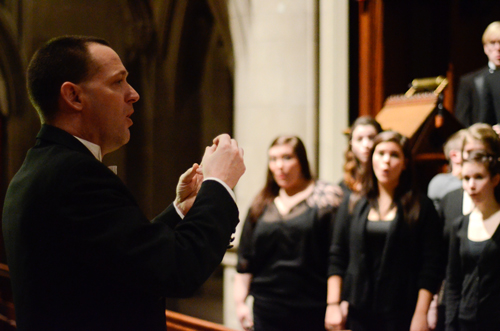
Dirk Garner with the BW Motet Singers
Published on ClevelandClassical.com April 14, 2015.
Click here for a printable copy of this article




